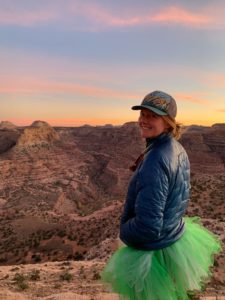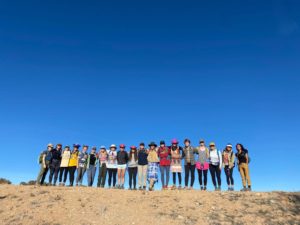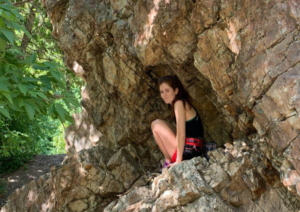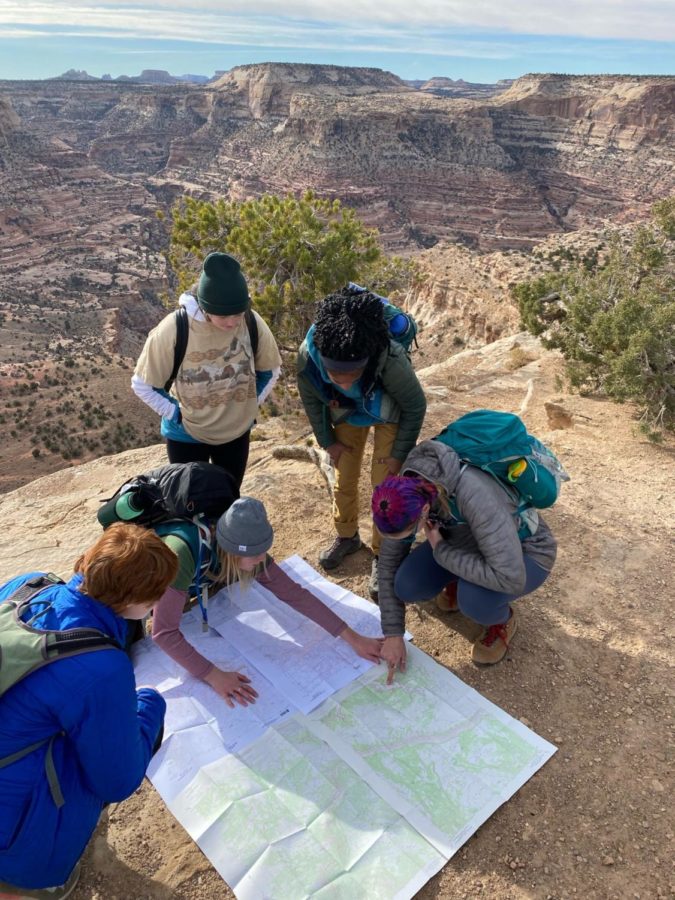“With Glitter on Our Faces”
The Rising Power and Place of Women in the Outdoors
“The outdoors are a sacred place to me, it’s my Sunday church, my therapist, my gym, and my place to roll around in the mud and get to know myself. They’re the stomping grounds for adventure and I believe it’s where your soul can truly be free.” -Emma Taylor
Being outside is beautiful, daring, wild, challenging, and freeing. No matter our gender identity or expression, backcountry spaces represent similar peace to all of us. There is no greater freedom than having the knowledge, encouragement, and community to explore the backcountry and feel included and supported while doing so. The rising presence and power of outdoor groups led by self-identifying women has changed the U campus community in the last year and asserted the leadership of women in the outdoors. The Women’s Outdoor Leadership Initiative (WOLI) was founded by Emma Taylor, a junior at the U, at the beginning of the fall 2021 semester with the goal of not only fostering a community of women with a shared love of the outdoors, but also empowering female-identifying students with hard skills and emboldening them to become leaders.
I began my interview with Taylor by asking her about her most memorable outdoor experience. “I think the most memorable trip for me was doing King’s Peak with two other girls I had just met at the time. We did it in about 30 hours and I almost puked and cried at the same time, Type 2 fun, but it filled me with a feeling I had never felt before. [We] called it Queen’s Peak, but we were the only group of all females that we saw in the entire trip, and it was surprising but it felt powerful. It was a different energy and sense of accomplishment that I can’t quite describe, but it was awesome and I wanted to keep doing things like that.”
Taylor explained what motivated her, along with her co-founders Gabrielle Sanzo and Katie Wehrly, to form WOLI:
“WOLI started after [I witnessed] how females were unintentionally treated in an outdoor setting and the lack of education and learning opportunities given to them due to their physical differences. We were a few weeks into [a] backpacking session when we started having discussions about the gender gap forming within our group, in terms of attitudes and grouping during the day. Girls [who were] 5’1” were carrying the same weight of packs as a 6’4” dude and naturally were going slower and having a harder time. This meant when we took breaks the boys got there first, figured out where we were on the map, scouted, and had the next leg of our day figured out by the time the smaller people got there and needed to take a break before continuing on. The lack of opportunity for the girls to learn the same thing really infuriated me and opened my eyes to the basis of why there is a gender gap in the outdoors.”

The outdoors have been traditionally male-dominated and can be an intimidating space for women, especially as newcomers to a specific activity. This can be especially true for sports that require harder skills or more physical strength to accomplish. Even on backpacking or camping trips with both men and women present, the gender gap is still evident. Taylor described her experiences with gendered roles in the outdoors: “I’ve definitely been told ‘you’re the woman, you can do the dishes’ after taking a cooking shift on a backpacking trip. I’ve been lucky where I haven’t had too many experiences with being excluded like so many others, but I definitely feel like I’ve had to work a lot harder than others to reach the same respect that a man automatically gets. I don’t think a lot of the time it’s intentional either, it’s wired into the subconscious of our minds, but it’s up to us to start changing that and proving how badass a woman is.”
I asked Taylor to describe how she hopes WOLI will impact women’s place and leadership in the outdoors and address gender barriers. She said, “We hope to create the future generation of female outdoor leaders and role models that will be competent and confident as they find their stride in the outdoor world. We hope that by creating leaders, [we’ll] inspire more girls to get out and show each other how powerful a woman is, and we’ll slowly have an impact on bridging the gender gap.”
The WOLI founders, along with the other officers Kendall Smith-Williams, Julia Stegvik, and Ainsley Lane, emphasize the importance of teaching women the skills they need. Backcountry navigation, wilderness medicine, belaying and rock climbing, canyoneering, and backpacking are a few of the skill areas and experiences that WOLI events have included. Women also have a role to play when it comes to transforming outdoor spaces and having an impact through environmental activism. WOLI has been involved with Save Our Canyons and Students for the Wasatch and has used its voice to educate and advocate for environmental protection of our backyard. Taylor explained why it’s important to her that WOLI supports environmental activism efforts: “Anyone in a leadership position in the outdoors has a duty to be an ambassador and an advocate for the area they’re recreating in. It’s our responsibility to be the protectors of our land, it’s part of leadership, and as our members grow, we want this to be something they know and support.”
WOLI actively confronts gendered barriers in the outdoors and promises a future of female outdoor leadership, and it starts with empowerment on campus: “WOMEN BRING THE FUN. The outdoors has historically been a boys club, and it’s time they made some room for the ladies to come play. Women support women, and when you take that attitude into the backcountry, it’s a powerful energy to be around. We’re gonna do the same trek to the same summit, but we’re gonna do it wearing a tutu with glitter on our faces.”



